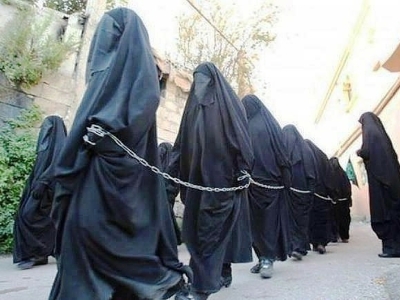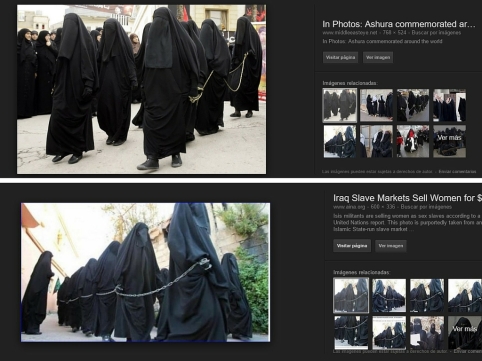 The photo that accompanies this article, or others similar, have been posted, shared and commented through social networks as expression of the inherent misogyny of Islam, with descriptions such as “DAESH taking women to sell in the concubine’s market” or “Muslim women being carried to forced marriages”. I’ve also seen this picture being used by some feminists in academic conferences to illustrate their presentations on the “Status of Women in Islam.”
The photo that accompanies this article, or others similar, have been posted, shared and commented through social networks as expression of the inherent misogyny of Islam, with descriptions such as “DAESH taking women to sell in the concubine’s market” or “Muslim women being carried to forced marriages”. I’ve also seen this picture being used by some feminists in academic conferences to illustrate their presentations on the “Status of Women in Islam.”
This photo has been misused. This image is taken from a religious event which is celebrated for Shiite Muslims to describe the terrible events that took place in Karbala 1,200 years ago. This act recalls the occasion when the family of the Prophet Muhammad, formed mostly by women, was taken prisoner, including children and forced to walk chained. History records and praises the courage of women who bear this painful pilgrimage instead of submit themselves to their captors.
“Muslim Women” is a Hoax
The polemic with these pictures confirm to me that we, Muslim women, are the biggest “Hoax” of the digital era. What is said about us in social networks, in the news, from traditional feminists, rarely corresponds to what we are and what we want to express. Almost everything that circulates on Muslim women, is based on the opinion of people who have no interest in hearing our voices.
Our passivity and inferiority are just cultural imaginaries. We are the “victims”, the “other” and the most exploited gender problem of the global age, thanks to the permanent and cumulative epistemic violence which we are subjected to.
Which is worrying for me is how often I find in my activities as a Muslim feminist that the most interested group in validating these readings and stereotypes are feminists themselves, especially western/white feminists or women of color who contribute to these discourses.
Once, I lectured on gender and colonial discourses in the representation of femininity and women in otherness. My presentation focused on how Muslim women were challenging these representations, making their voices heard and taking a stand. All interventions from the audience, made up mostly by women activists, were focused on convincing me that Islam was negative “Because I saw a video on youtube” and it was not possible for me to respond. It was not even possible to achieve agreement on the need for respect for the efforts of a group of women, in this case Muslim women, were doing to empower themselves. One hour of debate can be reduced to the phrase: “We’re right, you’re wrong.”
Why do some feminists choose to believe patriarchal narratives on Muslim women and discard our voices? Why they are ready to challenge and question everything but their own mental and cultural patterns? Why do they talk about sisterhood and cooperation if they are not willing to see other women as equally capable of empowerment in their contexts and experiences, even without their help?
There is no end of patriarchy without the end of colonization. Decolonizing it is not a matter of geographic locations but is about declarative places, epistemic justice and access to self representation. In the Internet age, ignorance is merely an excuse, therefore, I think there is a laziness of not wanting to know and a huge degree of pride.

Perhaps is not coincidence that many of the feminists attached to the submissive images of Muslim women have jobs where enabling those paradigms means a salary. The Hoax is joyfully exploited for NGOs, Social Media and everyone hungry for some attention. Colonialism in the discourse is an asset that allows a way of living, status, power, authority and privileges.
Rightfully Different and Equally Relevant.
The critical conversation we should be having is to answer the question about how to articulate efforts in all areas to deconstruct, give new meaning and respond in a coordinated manner against our oppression, at all levels. Because the best way to begin to seek justice for oppressed women in the world, either by DAESH, their husbands, or their governments, is to practice gender justice in the speeches and depictions.
No civilization has the privilege of misogyny, misogyny is the only civilization. Women around the world face an upsurging of violence; many are raising their voices to question the system in which we live and their position in it. This clamor for greater social justice and resistance to patriarchy has many scenes and voices rightfully different and equally relevant.
I do not deny that in Islam there is a patriarchal and exclusionary discourse on women, crossing all our religious narrative, from the hermeneutics of the Quran to ritual practices. Nor do I deny that in Muslim countries all kinds of atrocities are committed and there are challenges in terms of human rights that are urgent to attend. However, there and here, in the mosque and in the refugee camp, there are strong and brave Muslim women, questioning the status quo, risking their lives, being part of a global struggle for gender justice.
Social networks are a crucial tool for social change, for positioning and gather people around new knowledge and inclusive approaches about issues related to women rights and otherness. They make possible discussion on how tackling patriarchy and colonialsm and their stagnant representations about the feminine. For feminisms to be effective in this task, they must include decolonization strategies from within, internal revolutionary forces; only thus we can build a multidimensional, inclusive and strong “We” to facilitate collective action.
As Gloria Anzaldua said: ” The struggle has always been inner, and is played out in outer terrains. Awareness of our situation must come before inner changes, which in turn come before changes in society. Nothing happens in the “real” world unless it first happens in the images in our heads.”
 Vanessa Rivera de la Fuente is a Writer, Mentor and Community Educator in Capacity Building for Grass Roots Female Leaders and Advocates. A Feminist who is an Independent Researcher of Gender and Islam on Feminist Hermeneutics, Muslim Women Representations, Queer Identities and Movement Building. She blogs in Spanish at Mezquita de Mujeres, a site dedicated to explore the links between Gender, Religion and Feminism as well to Women from the Global South as Change Makers in their communities.
Vanessa Rivera de la Fuente is a Writer, Mentor and Community Educator in Capacity Building for Grass Roots Female Leaders and Advocates. A Feminist who is an Independent Researcher of Gender and Islam on Feminist Hermeneutics, Muslim Women Representations, Queer Identities and Movement Building. She blogs in Spanish at Mezquita de Mujeres, a site dedicated to explore the links between Gender, Religion and Feminism as well to Women from the Global South as Change Makers in their communities.


Thanks so much for sharing this information, and your experiences! I did not know about this pilgrimage or photo, and appreciate your challenge: “In the Internet age, ignorance is merely an excuse, therefore, I think there is a laziness of not wanting to know and a huge degree of pride.”
LikeLiked by 1 person
Thank you. Appreciated
LikeLiked by 1 person
Yes. What she (ferruling) said.
LikeLike
Well said. I’m going to use this in my Islam, Sex, and Gender course this year.
LikeLike
Thank you. Appreciated
LikeLike
Excellent essay exposing the projection of victimization on one group of people without bothering to listen to what these same women have to say… Patriarchy is an inner construct that belongs to us all. We need to be addressing it on an inner level as well as without.
LikeLike
Thank you for sharing the truth about the picture …. and I have a visceral reaction every time I see a Muslim woman covered in black. As someone raised Catholic, I remember what a big deal it was to be “allowed” to attend church without my head covered. Hijab is less thretening than niqab, but the very notion of “covering” puts me on the defensive.
LikeLike
Love that last paragraph suggesting that we need to recreate our world from our own hearts and minds, to envision a new liberation, and a new society, and then carry it through. Also you remind me how important FAR is in that regard for sure, thanks Vanessa.
LikeLike
Hillary’s campaign chair just came out and made a huge announcement on Hillary’s VP running mate: Hillary Clinton is very open to considering a female candidate to run with her!
If that happens, I hope Carol P. Christ, or one of the other great writers at FAR will do a post on that pic — it will probably be Elizabeth Warren, anyway I hope.
LikeLike
Informative! Thank you. So important we all keep talking, keep listening, keep from ‘Us Vs. Them’ thinking
LikeLike
I had not seen this. It is terrible when people do not realize what they are doing or intentionally spread hate and lies.
LikeLike
We all need to be more careful about how we take in information and “misinformation.” It is so easy to allow the our use of the internet to reinforce our own opinions and prejudices. Thanks for this important correction.
LikeLike
Thank you from the bottom of my heart. I say this as a British, extremely independant hijab wearing woman. I hate the fact that I am always spoken about by people who have no idea about what or why I am wearing the hijab. Instead of looking at me and thinking that I am subjugated, how about thinking that in this day and age for a woman to wear hijab is never going to be easy. We are discrimInated in every way possible. So to wear hijab you have to be 100% sure, very strong minded and not give a damn about how people will perceive you and that is me with bells on! I don’t discriminate on the basis of colour, gender, religious preference or dress so please don’t do that to me. Power to the sisters!
LikeLike
Drove me nuts when the US Gov’t came out with self praise about how they (especially GWBush) helped women get an education by invading Afghanistan and Iraq and building schools for girls. RAWA was already running schools for girls ….
Thank you for the info about the picture you posted. If I see it online, I’ll be sure to speak/write. I did check Snopes and didn’t find it there so it might not be that wide-spread.
LikeLike
This example of “faux”tography is a good reminder to check things from the Internet: I don’t like to think about how many times someone I thought was too intelligent to fall for false photos or information has sent me something egregious like this, which I then feel compelled to research and correct! It gets old.
Thanks for the thoughtful piece, Vanessa. Sterotypes, mis, and dis-information, lazy thinking, and plain nonsense — whether in religion or politics– seem more and more prevalent these days.
Salaamatum wa barakatum: peace and blessings.
LikeLike
over the top! I am especially grateful you shared these words here at FAR because the idea that Muslim women STILL do not get a chance at even a modicum of representative power over their own images is HUGE. We know it, but how do we share this knowledge with others without participating in that same image making scandal? This is a great way to start. Thank you for sharing amina
LikeLike
Thank you.Great article.
LikeLike